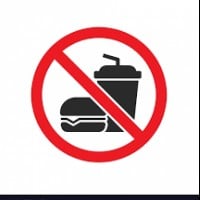Top 10 Worst Things About Recovering from Wisdom Teeth Extraction
It was Thursday, September 9th, 2021. My orthodontist looked at my most recent panoramic x-ray and scheduled me for an oral surgery consultation to have all 4 of my wisdom teeth removed due to the fact that the roots were already 1/3 formed (as well as the fact that my mouth can only hold 28 teeth) and to have a gold chain put onto my then impacted lower left canine.Fast forward a few months later on Thursday, 2/24/2022. I had the 2 procedures done and the surgery wasn't that bad. Unfortunately, I started feeling pain shortly after I left the building when the novocaine wore off and I remember how the right side of my mouth was more swollen than the left. The next few days were even worse than the day of the surgery.
The only good part about the recovery was not having to do gym class for a week when I returned to school on 3/1/2022. Other than that, it sucked.
In this list, I will be explaining the worst things about recovering from having your wisdom teeth extracted based on my experience. I've been meaning to make this list since March, but I forgot about it until now.
Also, here's to my comeback on TheTopTens. This is my 4th list of the month and yet there are still a lot more lists by me to look forward to.

This one isn't really surprising, especially if your 3rd molars were surgically extracted like mine were. What may be surprising is how unbearable the pain is and how 1 side may be more swollen than the other. I remember hearing my surgeon mentioning something about how complicated removing my lower right wisdom tooth was during the procedure (I was awake for it), so that probably explains why the lower right quadrant of my mouth was the most painful area and why it was so swollen. Needless to say, I looked like a chipmunk for a week.
I remember having to take ibuprofen every 6 hours for the first 4 days after having my wisdom teeth removed because it always wore off within a 6 hour time frame, usually within 4 - 5 hours. I remember counting down the minutes until the 6 hour mark so that I could retake ibuprofen and not have to suffer in pain.
Something that nobody else will tell you about recovering from having your wisdom teeth removed is the fact that leaning your head forwards or even holding upright will be painful and that tilting you head back or laying down eases some of the pain. This is something I've noticed immediately while I was at home recovering from the procedure. From 2/25 - 2/28/2022, I would lay in bed most of the day unless I had to get up and I would turn my head upwards whenever I had to be in an upright position such as if I had to walk somewhere or sit up.

In addition to feeling pain in your cheeks, you may also feel pain in your throat and maxillary sinuses if you also had your upper wisdom teeth removed (especially since most surgeons remove all 4 at once). I remember having a sore throat on 2/25/2022 in addition to cheek and sinus pain as a result of the surgery I had the day prior.
I like how you used my image. Also even though I have never had my wisdom teeth removed, I have had a tonsillectomy and I can relate to some of these items. Great list.
I remember waking up around 1 a.m. on Saturday, 2/26/2022 with severe pain on the right side of my mouth. I tried to get back to sleep, but the pain was that bad and I had taken ibuprofen only 4 hours earlier. I eventually got a frozen water bottle from the freezer, placed it onto my cheek, and went back to bed.
Let's just say those were not the best nights of sleep.
After the procedure was over, my surgeon called my mom into the room shortly before I left and wrote a prescription for amoxicillin to prevent any post surgical infections. I remember having to take it every 8 hours 3 times a day for a week after I had the procedure.
Even after I went back to school on 3/1/2022, I still felt some pain in my mouth, but I didn't have to take ibuprofen because the pain was a lot more tolerable by then. I still felt some pain for around 2 weeks after the procedure, but at least it wasn't as bad as it had been in the first few days.
The day after I had my wisdom teeth removed, I noticed that I couldn't open my mouth as widely as I could before the procedure. This is a normal thing to experience after the procedure, but it still sucks that you have to wait a few weeks to be able to fully open your mouth again.
Dry socket is a painful condition where the blood clot either becomes dislodged or doesn't form. This condition is very painful from what I've heard. I spent a few days worrying about whether my pain was normal or whether I developed dry socket, but I probably didn't since dry socket doesn't respond at all to pain medicine. Still, it's something you have to worry about after the procedure and this is also why your surgeon will tell you that you can't drink anything from a straw for a few days.
The only thing I could eat was soup, not too hot of course. I was able to eat chicken, but I had to cut it into teeny tiny pieces, because my mouth was so swollen.
For the first week or so, I remember how annoying it was to have to rinse my mouth with salt water constantly, especially during the first few days after the surgery when it was straight up painful.
